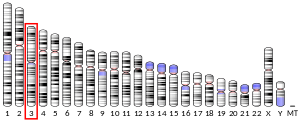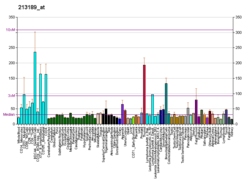RIOX2
Ribosomal oxygenase 2 is a protein that in humans is encoded by the RIOX2 gene.[5][6]
References
- 1 2 3 GRCh38: Ensembl release 89: ENSG00000170854 - Ensembl, May 2017
- 1 2 3 GRCm38: Ensembl release 89: ENSMUSG00000022724 - Ensembl, May 2017
- ↑ "Human PubMed Reference:".
- ↑ "Mouse PubMed Reference:".
- ↑ Tsuneoka M, Koda Y, Soejima M, Teye K, Kimura H (Sep 2002). "A novel myc target gene, mina53, that is involved in cell proliferation". J Biol Chem. 277 (38): 35450–9. doi:10.1074/jbc.M204458200. PMID 12091391.
- ↑ "Entrez Gene: MINA MYC induced nuclear antigen".
Further reading
- Bonaldo MF, Lennon G, Soares MB (1997). "Normalization and subtraction: two approaches to facilitate gene discovery". Genome Res. 6 (9): 791–806. doi:10.1101/gr.6.9.791. PMID 8889548.
- Strausberg RL, Feingold EA, Grouse LH, et al. (2003). "Generation and initial analysis of more than 15,000 full-length human and mouse cDNA sequences". Proc. Natl. Acad. Sci. U.S.A. 99 (26): 16899–903. doi:10.1073/pnas.242603899. PMC 139241. PMID 12477932.
- Teye K, Tsuneoka M, Arima N, et al. (2004). "Increased Expression of a Myc Target Gene Mina53 in Human Colon Cancer". Am. J. Pathol. 164 (1): 205–16. doi:10.1016/S0002-9440(10)63111-2. PMC 1602225. PMID 14695334.
- Ota T, Suzuki Y, Nishikawa T, et al. (2004). "Complete sequencing and characterization of 21,243 full-length human cDNAs". Nat. Genet. 36 (1): 40–5. doi:10.1038/ng1285. PMID 14702039.
- Eilbracht J, Reichenzeller M, Hergt M, et al. (2004). "NO66, a Highly Conserved Dual Location Protein in the Nucleolus and in a Special Type of Synchronously Replicating Chromatin". Mol. Biol. Cell. 15 (4): 1816–32. doi:10.1091/mbc.E03-08-0623. PMC 379278. PMID 14742713.
- Tsuneoka M, Fujita H, Arima N, et al. (2005). "Mina53 as a potential prognostic factor for esophageal squamous cell carcinoma". Clin. Cancer Res. 10 (21): 7347–56. doi:10.1158/1078-0432.CCR-03-0543. PMID 15534111.
- Eilbracht J, Kneissel S, Hofmann A, Schmidt-Zachmann MS (2005). "Protein NO52--a constitutive nucleolar component sharing high sequence homologies to protein NO66". Eur. J. Cell Biol. 84 (2–3): 279–94. doi:10.1016/j.ejcb.2004.12.022. PMID 15819408.
- Zhang Y, Lu Y, Yuan BZ, et al. (2005). "The Human mineral dust-induced gene, mdig, is a cell growth regulating gene associated with lung cancer". Oncogene. 24 (31): 4873–82. doi:10.1038/sj.onc.1208668. PMID 15897898.
- Rual JF, Venkatesan K, Hao T, et al. (2005). "Towards a proteome-scale map of the human protein-protein interaction network". Nature. 437 (7062): 1173–8. doi:10.1038/nature04209. PMID 16189514.
- Kimura K, Wakamatsu A, Suzuki Y, et al. (2006). "Diversification of transcriptional modulation: Large-scale identification and characterization of putative alternative promoters of human genes". Genome Res. 16 (1): 55–65. doi:10.1101/gr.4039406. PMC 1356129. PMID 16344560.
- Teye K, Arima N, Nakamura Y, et al. (2007). "Expression of Myc target gene mina53 in subtypes of human lymphoma". Oncol. Rep. 18 (4): 841–8. doi:10.3892/or.18.4.841. PMID 17786344.
- Ishizaki H, Yano H, Tsuneoka M, et al. (2007). "Overexpression of the myc target gene Mina53 in advanced renal cell carcinoma". Pathol. Int. 57 (10): 672–80. doi:10.1111/j.1440-1827.2007.02156.x. PMID 17803656.
This article is issued from
Wikipedia.
The text is licensed under Creative Commons - Attribution - Sharealike.
Additional terms may apply for the media files.





